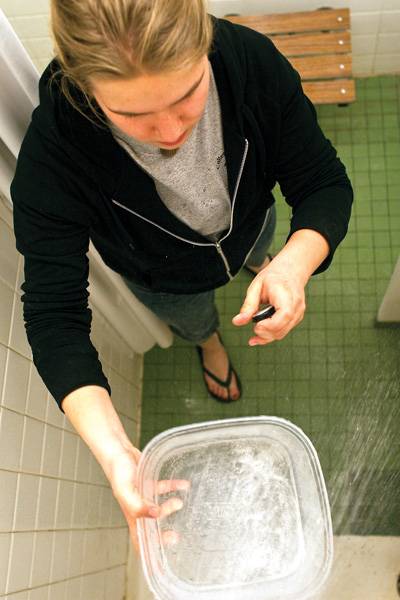Living sustainably in the dorms

Meghan Roberts, senior in civil engineering, monitors the amount of time it takes to fill a container with water with the shower running at full capacity in the Friley Hall dorm bathrooms Wednesday. Roberts got involved with water issues after visiting Africa and finding how scarce and precious it is there. She said that while she was visiting Africa she didn’t use as much water as she was used to using here and it helped to put the current global water problems into perspective. “I got involved because I know how much of a problem it is,” she said. Photo: Rashah McChesney/Iowa State Daily
April 1, 2009
Every day in the residence halls, students wake up, walk down the hall and shower.
For the first few hours in the morning, the hiss of multiple showers going at once can be heard in the hallways.
At some point in the morning, this sound evaporates, just like the steam from all those showers, and students go on with their daily routines.
The next day, the residence hall showers go through the same cycle — wake, hiss, evaporate. And so it goes the next day, and the day after that.
Taking a shower is such an ingrained procedure for most people that they never think twice about it.
But Meghan Roberts, senior in civil engineering and Friley Hall community adviser, sees the simple shower as an opportunity to take care of the planet.
Roberts has pinpointed the showers in the residence halls as a part of university life that she can work on for more conservation.
The water used daily is not an unlimited resource, Roberts said.
“The water will run out,” she said.
Yes, the earth is full of water — but most of it is saltwater. Fresh water, used not only to hydrate people, but also for irrigation and countless other things, only makes up one percent of the world’s water supply, Roberts said.
According to the World Bank’s Web site, 700 million people live in countries experiencing water stress or scarcity.
In an effort to help the campus community become more mindful of water usage, Roberts has taken it upon herself to measure the water flow from the shower heads in some of the residence halls.
Pete Englin, director of the department of residence, said Roberts has advocated purchasing low-flow shower heads for the residence halls.
She started discussions about student testing of low-flow shower heads for a designated period of time to see if the campus community would be open to the idea. Right now, Roberts contends that the pressure is far higher than it should be, wasting water.
Roberts said her experiences in Uganda with the student group Engineers for a Sustainable World, and in Mali with the mechanical engineering department, have brought the issue of water conservation to the front of her mind.
“When I was in Mali, there was one water tank for the village,” Roberts said. “And they’re right on the Sahara Desert, so it was solar powered.
But the pump would only run if it was sunny that day — most of the days were sunny, but the pump would not run at night, so it wasn’t able to fill back up completely with water until the next day.”
The tank provided the village’s larger water needs every day, and there was a small hand pump as well, but it was difficult to retrieve water with it.
“It was very hard to get water,” Roberts said. “The ground water table there is lowering.”
In Uganda, Roberts said her experiences with water availability were similar.
“Quite often there were power outages and water shortages,” Roberts said.
Roberts said in order to conserve water on campus, students can take shorter showers, wear some clothing items a couple times a week to reduce the laundry loads and turn the water off while brushing teeth.
She said students, ideally, should have low-flow shower heads and low-flow toilets.
However, that isn’t always possible since the kind of appliances students have are not always their decisions.
Englin said Roberts has been vocal about other sustainability-related issues on campus as well, such as recycling.
“The concept of recycling has always been primarily student-driven with some support from staff, and that tends to make it much more effective,” Englin said.
“What she has raised as an issue is that we have an obligation as a department to raise this issue of recycling.”
Englin said Roberts has encouraged leaders in the residence halls to implement a department-wide recycling program that more actively educates students about recycling.
“Students can then leave with that education while they may have not brought it with them initially,” Englin said of the proposed program.
He said Roberts has been a “tremendous advocate” for sustainability issues for the last two years.
This began with her past role as Friley Hall president and continues in her current role of community assistant for Henderson.
“She came from a background where she’s had a lot of life experiences in sustainability, and she is helping to inform where we need to move forward,” Englin said.






